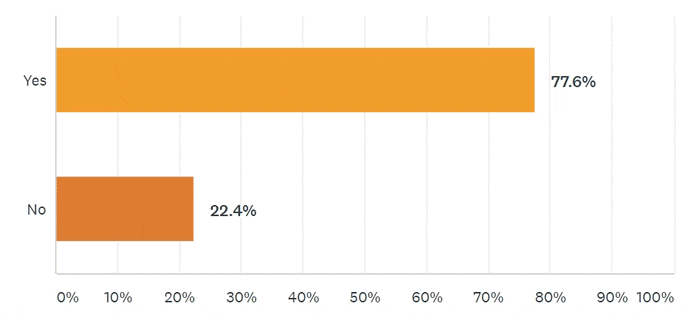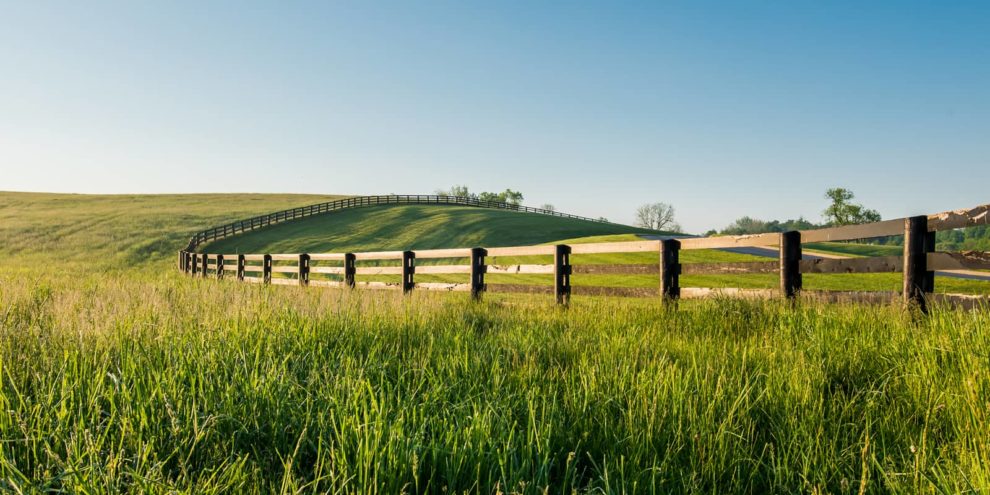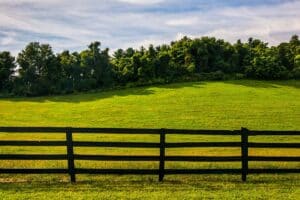Since COVID-19 struck in the early days of March 2020, the number of people swapping city life for country living has risen. According to the April LANDTHINK Pulse results, 77.6% of respondents believe that the migration of people from big cities and metropolitan areas to rural locations will continue post-pandemic. Americans fled big cities in droves, flocking to rural spots to wait out coronavirus lockdowns and stay-at-home orders and have more space while they were quarantined. With people demonstrating that their jobs can be done just as effectively from home and a lot of companies offering their employees the opportunity to work remotely for good, rural America is having a moment.
Last month, the April Pulse asked: Post COVID-19, do you think people will continue to leave larger cities and relocate to rural areas?
April Pulse Sponsored by
Since the pandemic began, searches for land on LANDFLIP have reflected this surge of interest in rural areas. “Farmland” and “off-grid” were the most searched keywords. Higher search volumes on LANDFLIP have coincided with a booming land market, especially in the Southeastern United States. Speculation grows as to whether rural relocation will be short-lived and diminish with the vaccine or instead be emblematic of a permanent movement towards rural residence.
Based on the results last month’s survey question, the majority of our audience (77.6%) believe that even after the pandemic passes, people will choose to leave big-city life behind.

There are several reasons why we can expect this trend to continue:
Freed by Remote Work
Remote work was a full-on global work movement even before the coronavirus pandemic pushed people into isolation and stay-at-home orders forced them to make an abrupt shift to working from home. But now, remote work is the footing that makes relocating to a rural community possible in a way that didn’t exist in the past. Many businesses were skeptical about remote work, but after everyone settled in, it is apparent that employees can be productive and focused when not in the office—in many cases, even more so. Since technology provides the virtual connections to keep productivity going, the need to be physically proximate has disappeared.
The Pew Research Center reports that broadband internet access, that allows people to do things like video conference through applications like Zoom and Skype, has grown considerably in rural and suburban areas.
Employers have begun to understand that remote work really works. And as it turns out, it’s proving to be beneficial for both employees and employers. Companies are making the decision to keep employees working remotely. While they may have to spend more money on technology, they save on real estate costs, utilities, insurance, and taxes. Other benefits associated with remote work, like employee retention and increased productivity, also save money in the long term.
The combination of increased opportunity for remote work and technology that has allowed work environments to become more flexible and customizable, should continue to spur workers to leave major cities in search of more space.
The Trend of Americans Leaving Large Cities was Already Starting to Emerge
There’s no doubt the coronavirus set off a great migration in the U.S. last year, but it just amplified a trend that was already there. In the last five years, large U.S. cities lost tens of thousands of people, mostly millennial and younger Gen X residents.
Millennials are the best-educated generation in history and have similar goals as the generations before them. They want to get married and start families of their own. For most, residing in larger cities is incompatible with their desired lifestyle. People are also moving to rural areas to meet their financial goals, as the cost of living is generally much lower in small towns. However, the main driver is that people want more space, as evidenced by the hot rural land market. Buyers are seeking rural land for sale (with existing homes or room to build) that offer space for their families, home offices, designated areas for remote learning for their children, and plenty of wide open areas for outdoor activities.
Population density makes social distancing difficult, right next to impossible. The lower population density of rural communities makes social distancing not only easier, but practically automatic. Pandemic fears, fears of a future pandemic, high rates of crime and civil unrest, are all factors that have prompted many people to reappraise urban living and make the switch to country living.
Our informal online survey revealed that 77.6% of our LANDTHINK audience believe that post-pandemic, people will continue migrating to rural areas. Only 22.4% of respondents expect to see the number of people living in cities for the countryside slow down after the pandemic.
LANDTHINK would like to thank Mossy Oak Properties for sponsoring the April Pulse and for coming up with a very interesting question to pose to our audience. The Mossy Oak Properties network, which began franchising operations in 2002, now has over 100 real estate brokerage franchises in 30 states throughout the country, with the network completing 4,200 transactions totaling $925M+ in sales volume for 2020. Mossy Oak Properties knows rural land and real estate. They are America’s Land Specialist. Contact Mossy Oak Properties today to find your favorite place!
Become a Pulse sponsor! It’s a great way to ensure your brokerage is the first one buyers and sellers call when they have a need to buy or sell property. You’ll get insane exposure on Social + Email + Web. That’s 500,000+ monthly eyes on you! Once you have it, you won’t want to give it up! Pulse sponsorships are offered on a first come first serve basis and are subject to certain limitations. If your business would be interested in sponsoring a Pulse question, please contact us soon.
Do you have a Pulse question you’d like to suggest? Submit your question and we might choose yours!
We want to know what you think about our July Pulse question, chosen and sponsored by Farm Credit Associations of Georgia: If you were to purchase undeveloped rural land, what’s the first improvement you would invest in? Answer now.
This content may not be used or reproduced in any manner whatsoever, in part or in whole, without written permission of LANDTHINK. Use of this content without permission is a violation of federal copyright law. The articles, posts, comments, opinions and information provided by LANDTHINK are for informational and research purposes only and DOES NOT substitute or coincide with the advice of an attorney, accountant, real estate broker or any other licensed real estate professional. LANDTHINK strongly advises visitors and readers to seek their own professional guidance and advice related to buying, investing in or selling real estate.











Add Comment